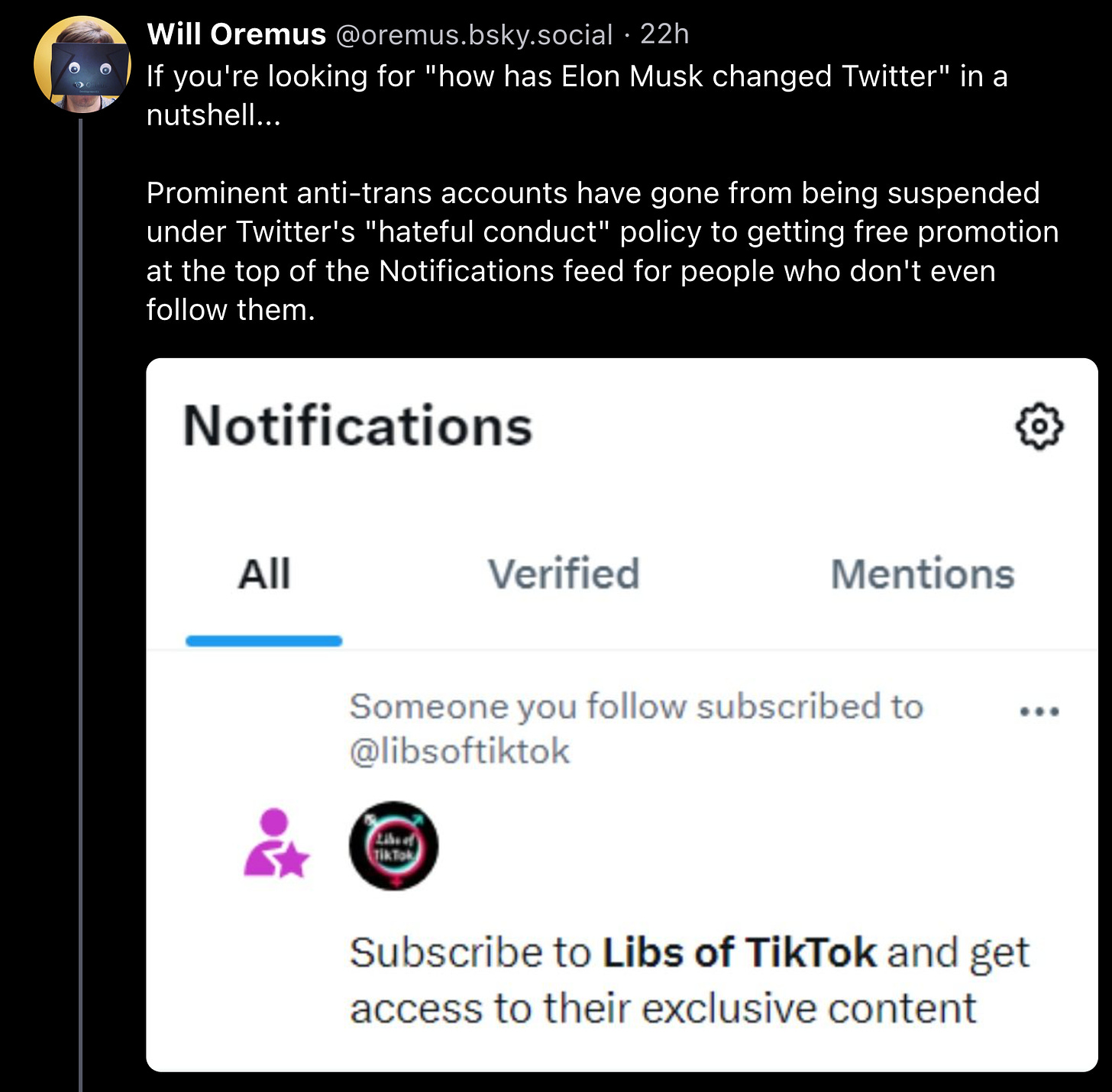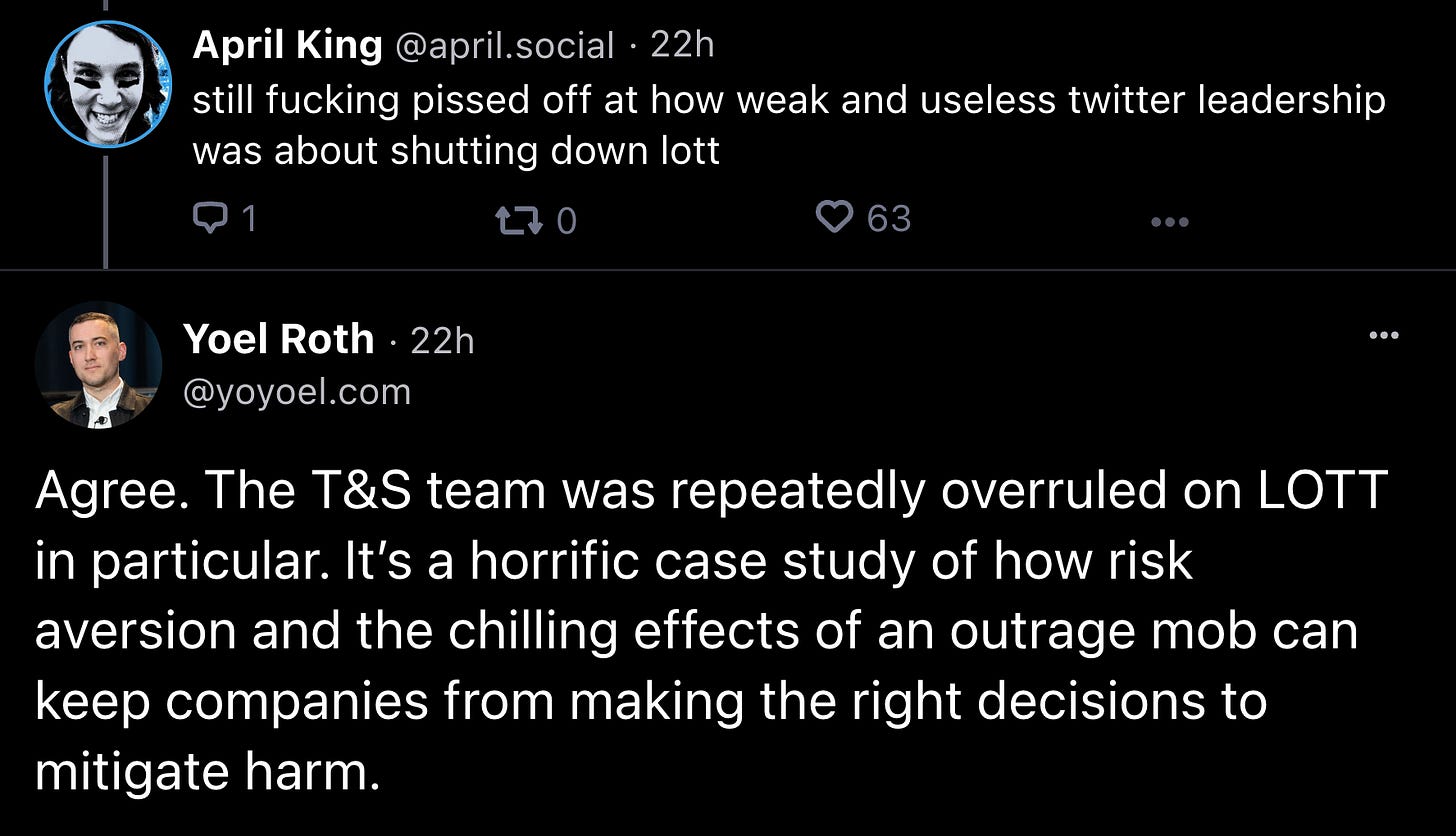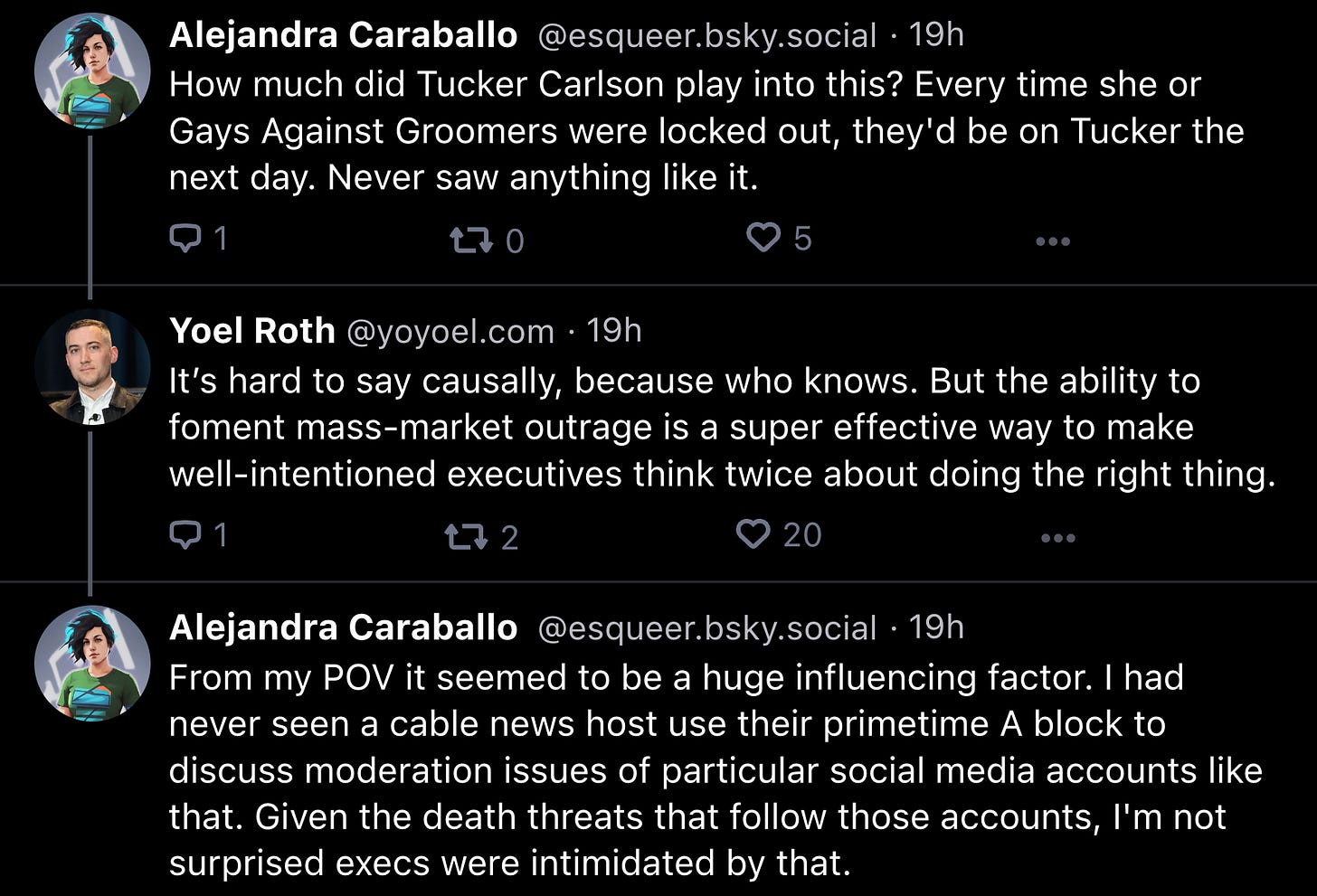~~ recommended by newestbeginning ~~
Fear Of Right-Wing Outrage Makes Us All Worse Off
Hello, dear readers. I hope you are well.
I want to talk a bit about social media and *gulp* politics today — specifically, how the two intersect and why the combination so often makes us miserable. It gets a little ranty toward the end. Fair warning!
Over at his Garbage Day newsletter, Ryan Broderick has a smart piece about a time when the internet (and social media) could be fun. “Not entertaining. Not engrossing. But fun,” as he writes. It, like so much of what he puts out into the world, is worth reading in full, so I recommend you go do that.

The context being discussed in his piece is Bluesky, the latest in a long line of Twitter alternatives. For the moment, Bluesky is, well… fun. It feels like a cool little place to hang out online with friends and acquaintances, where you don’t have to worry about a group of people willfully misinterpreting something you posted in a bizarre effort to score imaginary internet clout points (if the words “chili discourse” don’t mean anything to you, consider yourself lucky).
There’s one paragraph in Broderick’s piece I want to highlight:
And I hate to end this on a bummer note, but it’s important to be clear about this. There is a global right-wing movement that agrees on almost nothing other than the desire to overrun online spaces with annoying discourse, harassment, intimidation, and violence. They have made it their central project for almost a decade and any new social network that gets popular enough will be targeted by these people. They’ve done it to Reddit, to Tumblr, to Twitter, to YouTube, you name it. And if Bluesky successfully takes off, they will show up there too.
There have been a number of right-wing social media platforms that have popped up in recent years, many of which have received significant funding. One by one, they failed. Parler, Gab, Gettr, Truth Social — even the people who are (or were) on those sites spend their time scrolling and posting on the more mainstream social networks (Facebook, Twitter, etc.). The reason is simple: their political beliefs and their lives, generally, revolve around mocking and tormenting their political opponents. They don’t stand for anything so much as they stand against things they’ve collectively decided to hate. In short, they need to “own the libs” to have fun.
As Broderick adds in a series of Bluesky skeets:
Beginning to see more conservatives migrate here from Twitter. They’re already whining about inclusion. It’s not about socializing though, they can do that on [Parler]. It’s about disrupting the app for everyone else.
Conservatism has completely devolved into a series of disconnected grievances that don’t make any sense and the only thing holding the project together is the obsession with trying to dominate digital spaces to spew bull shit. Without an Other to wage a digital war against there is no real goal.
1) They had alternative social networks long before liberals and leftists did and they got bored of them and went back to Twitter. 2) They could now just stay on Twitter after they trashed the place and broke it. 3) But they’ll come here next because it’s about disrupting how the left communicates.
The Present Age is 100% reader-supported. Please consider becoming a subscriber.
And this isn’t necessarily some new observation, either. Here’s a June 2021 Facebook post from Adam Bates about Donald Trump’s short-lived blog (h/t to Aaron Ross Powell on Bluesky):
re: Trump's blog shutting down for lack of anyone's interest in it.
I've said it before: the value for conservatives in social media comes almost entirely from being able to antagonize people who don't want to interact with them.
Once you strip away the "making the libs cry" aspect of conservative social media, they lose all interest in talking to each other. That's why Parler failed, that's why Trump's blog failed, that's why these people won't just leave these platforms they hate so much.
And that is the underlying principle behind their hysteria toward "cancel culture" and deplatforming. They aren't upset at losing the right to speak (nor have they lost it). They're upset that they're being deprived of access to a captive audience of non-conservatives to upset.
It's not advocacy for free speech, it's advocacy *against* the freedom of association.
On a related note, here’s a Bluesky interaction I’ve been thinking about since yesterday:
Washington Post reporter Will Oremus pointed out an example of how Elon Musk “changed Twitter”:
“Prominent anti-trans accounts have gone from being suspended under Twitter’s ‘hateful conduct’ policy to getting free promotion at the top of the Notifications feed for people who don’t even follow them,” he wrote, referencing the “Libs of TikTok” account.
F
Former Twitter employee from the pre-Musk days April King responded, “Still [f*cking] pissed off at how weak and useless Twitter leadership was about shutting down [Libs of TikTok].”
Yoel Roth, who led Twitter’s Trust & Safety team pre-Musk (and at the very beginning of Musk’s leadership), responded by acknowledging that his team “was repeatedly overruled” when it came to Libs of TikTok, calling it “a horrific case study of how risk aversion and the chilling effects of an outrage mob can keep companies from making the right decisions to mitigate harm.”
In short, fear of right-wing outrage kept Twitter from enforcing its rules. Libs of TikTok was obviously and consistently breaking Twitter’s terms of service, but was given special treatment because any action taken against that account would result in an appearance on Tucker Carlson’s TV show and a days-long rage campaign.
“The ability to foment mass-market outrage is a super effective way to make well-intentioned executives think twice about doing the right thing,” Roth wrote.
This is how the right operates. All the time. They
This is how the right operates. All the time. They demand to not only be included but to be able to do anything they want, as well.
This isn’t just something that happens with social media, but with, well, everything.
In December 2016, Paul Waldman wrote an opinion piece for The Week titled, “Donald Trump will be president because James Comey and Loretta Lynch were scared.” In it, he points to a Washington Post account of Comey’s decision to send congressional Republicans a letter announcing that the FBI’s inquiry into Hillary Clinton’s emails was ongoing (Trump was also being investigated, but the public didn’t find out about that until much later. Go figure.):
Comey's letter was not only unprecedented, it was a clear violation of FBI policy, which states not only that the bureau should not comment publicly on pending investigations, but that they need to be particularly careful not to discuss investigations about any public official in the days before an election, since that could sway the results. But despite the fact that he didn't even know what was in the emails, let alone whether there was any reason to suspect something criminal might emerge (and as it turned out, there wasn't), Comey decided to violate that policy, and do so in a way that would reinforce exactly the argument Donald Trump was making about Clinton.
A greater gift Trump could not have dreamed of. Just as anyone who had been paying attention would have predicted, the news media seized on Comey's letter as though it were a combination of D-Day, the moon landing, and the death of Michael Jackson.
So why did Comey do it? "Battered by Republican lawmakers during a hearing that summer, Comey feared he would come under further attack if word leaked about the Clinton case picking up again." He was afraid of the Republican outrage machine. What would they accuse him of? What names would they call him? What vitriol would he have to endure? Whatever he imagined, the thought was too much to bear.
And Loretta Lynch, who is Comey's boss, could have ordered him to adhere to departmental policy and refrain from injecting himself into the presidential campaign in such an inflammatory way. But she didn't. Why? "Lynch and her advisers were nervous about how it would look if people found out that she, a Democratic presidential appointee, told Comey to keep secret from Congress a new development in the Clinton investigation." In other words, she too feared the outrage machine. And the result was that Donald Trump will be president of the United States.
If you’re ever curious how Republicans, with their unpopular policy ideas and bizarre fixations on “culture war” issues, continue to accrue and wield power in this country, you certainly have to factor in the role that fear and outrage play in decisions big and small.
For about a month now, the right has raged at Bud Light for doing a one-off promoted post aimed at the audience of trans social media influencer Dylan Mulvaney. The New York Post plastered Mulvaney’s face on the paper’s front page. Fox News ranted about how out-of-touch Bud Light was. The right worked itself into a frothy rage over an ad that wasn’t targeted to them in the first place. The objection wasn’t based on Mulvaney’s content or anything like that. The issue was simply that Mulvaney is trans, and they believe that trans people shouldn’t be allowed to exist in public.
The right’s goal is to make corporations fearful of their outrage and try to avoid it by preemptively excluding certain groups — in the case of Bud Light, the goal was to make companies (not just Bud Light) afraid to partner with trans people in any capacity. Even if companies don’t explicitly say, “We will no longer hire trans people,” the seed has been planted and will go far beyond social media influencers.
If two people with identical qualifications apply and interview for a job, and one of them is trans, the right’s goal is to make hiring managers veer away from the trans candidate. If companies take part in a wide range of community outreach initiatives, the right’s goal is to make sure that trans people (and LGBTQ people, generally) are not included in that (this is what happened with the right-wing backlash to State Farm).
Maybe this doesn’t affect a group that you belong to. Yet. But it might, as, again, the right needs an Other to rage against.
Just as Twitter bending over backward to appease right-wing media when it came to Libs of TikTok and Facebook’s attempt to placate the right in 2016 by amplifying conservative posts and exempting top accounts from platform rules didn’t stop the right from continuing to accuse both companies of “anti-conservative bias” — and, in the case of Twitter, just helped clear the way for Elon Musk to purchase the company and transform it into a wildly right-wing hate platform… which some conservative accounts will still claim is biased against them — there’s nothing Bud Light or State Farm or any other corporation can do short of openly endorsing its eliminationist policy views (which Bud Light essentially does anyway in the form of donations to Republicans) that will make the right happy.
Why? Because, simply put, they are not for anything. Their entire political ideology is built on being against groups of people. Until politicians, businesses, celebrities, and regular people tell them to kick rocks when they try to stir up a new controversy, they’re only going to become more extreme, not less.
Anyway, thanks for reading. I know today’s edition of the newsletter was a bit ranty, but it’s something I’ve been thinking about for a bit. Sorry about any typos, etc. This is just sort of a stream-of-consciousness type of post.
Please enjoy this video of the band Wilco playing the song “Sky Blue Sky”:



No comments:
Post a Comment